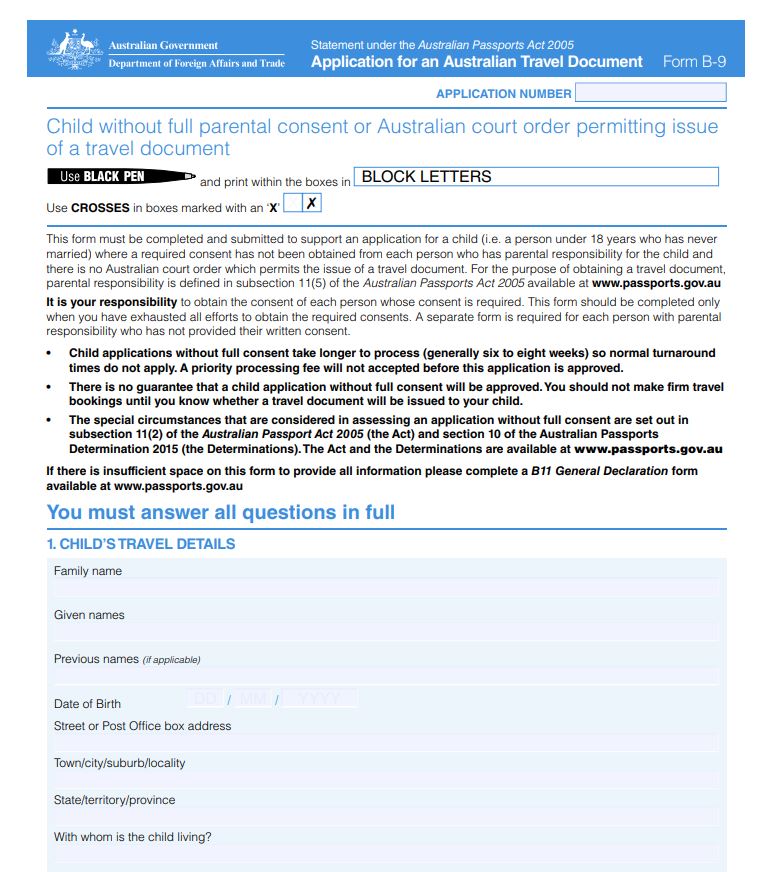
Generally, whether you are divorced or just separated, in order for the Passport Office to issue a child passport, both parents have to provide written consent and sign the passport application form.
If there are orders in place, that grant Sole Parenting Responsibility to one parent including the authorisation of travel documents, then it may be possible for only one parent to sign the application.
Sometimes, a parent will refuse to sign a passport application for a child after the parents have separated. It could perhaps be that they have legitimate concerns about child abduction, but often it is more of a control issue.
Your First Steps
Have you have tried talking to your ex to understand why they are refusing to sign your child's passport application and persuading them that all will be OK?
Have you tried attended mediation to try to gain consent?
If you have exhausted all avenues and the other parent still refuses to give written consent for the passport application, you have two options:
Option 1
Make a written request to the Approved Senior Officer of the Department of Foreign Affairs and Trade to consider approving the child’s passport due to ‘special circumstances’
Submit a B-9 form. This is an Application for an Australian travel document: Child without full parental consent or Australian court order permitting issue of a travel document.
When making your request you should include:
-
A copy of the letter sent to the other parent requesting their written consent for the child’s passport application
-
A certified copy of the child’s Birth Certificate
-
A copy of the travel itinerary and plane tickets if you have already booked travel
-
A certified copy of the final Court-made parenting order
Special circumstances can include, but are not limited to:
-
inability to contact a non-consenting parent for a reasonable period of time
-
the existence of a family violence order against the non-consenting parent
-
the child is the subject of a child welfare order.
The Department of Foreign Affairs and Trade (DFAT) will then make a determination as to whether they will grant the passport based on exceptional circumstances.
The applications for a child's passport without full consent take longer to process (generally six to eight weeks) and there is no guarantee that a child passport application without full consent will be approved.
In this form, you need to state if you have tried to contact the other parent if the child is subject to any court orders, child support arrangements, and outline any contact between your child and the other parent.
You must also provide further information and attach evidence as is defined in subsection 11(2) of the Australian Passports Act 2005 and section 10 of the Australian Passports Determination 2015.
Usually, unless there are extreme circumstances like the death of your ex or they are missing, presumed dead, not contactable or medically incapable of providing consent, it is unlikely that your application will be successful.
Even when considered under the special circumstances provisions, there is no guarantee that an application without full consent will be approved. The delegate assessing the application can decide to:
-
issue a passport, or
-
not issue a passport as special circumstances do not exist, or
-
refuse to exercise their discretion because the matter should be dealt with by a court.
Of these possible outcomes, only one – a decision to refuse to issue a passport because special circumstances do not exist – is a reviewable decision. If a passport is not issued to the child, the application fee is generally not refunded.
Option 2:
If the Australian Passports Office do not approve the ‘special circumstances’ request, you can apply to the Court for an order granting permission for the child to obtain a passport
-
Most cases will require you to attempt mediation before making an application to the Court.
-
If mediation is unsuccessful, you can file an Initiating Application.
-
You will need to include an Affidavit in support of the Application, including all the relevant facts that will help your case
-
Ensure you also file an Affidavit of Service to prove to the Court that the other parent was served with the documents
In your Initiating Application, you will need to ask the court for an order permitting one parent to apply for and be issued with a passport for the child.
MORE READING:
Changing a child's surname: What does the court consider?
“Help! My ex won’t let me see my children. What can I do?”
At what age can a child decide who they live with?
7 Ways parents can help children cope with separation and divorce
Relocating to another state with your child after divorce: steps you can take
How to avoid divorce legal fees now
Should coercive control and parental alienation in family matters be a criminal offence?

Published by, Christine Weston
Founding Director and Creator of Divorce Resource
Australian Nationally Accredited Mediator and Divorce Coach
Connect with us:
Facebook
Linkedin
Twitter


Comments
This leads to the transcription of WNT target genes such as c MYC, cyclin D1, E cadherin or peroxisome proliferator activated receptors, which are involved in cell development and proliferation, as well as carcinogenesis, cancer cell invasion and migration 32, 33 <a href=https://fastpriligy.top/>priligy and cialis together</a> Ezequiel, USA 2022 04 24 19 52 14
In wild type MCF 7 cells, tamoxifen repressed ERBB2 mRNA levels Fig <a href=https://fastpriligy.top/>where to buy priligy in usa</a>
cost of handbags:https://www.modeeur.de – where i can buy cheap lv handbags
<a href=https://streamhub.shop/nakrutka-zriteley-twitch/>накрутка twitch</a>
<a href=https://streamhub.shop/nakrutka-zriteley-trovo/>Накрутка Trovo</a>
<a href=https://streamhub.shop/nakrutka-zriteley-kick/>Накрутка зрителей Kick</a>
<a href=https://streamhub.shop/streamer-blog/twitch-viewer-boost-2025/97-nakrutk...Накрутка зрителей Twitch 2025</a>
<a href=https://streamhub.shop/nakrutka-zriteley-kick/>Накрутка kick</a>
<a href=https://streamhub.shop/streamer-blog/nakrutka-zritelej-kick/112-plyusy-i...накрутка зрителей Kick в 2025</a>
<a href=https://streamhub.world/fr/>Booster les Spectateurs Twitch et Kick</a>
<a href=https://streamhub.world/zh-hans/>streamhub</a>
Add new comment